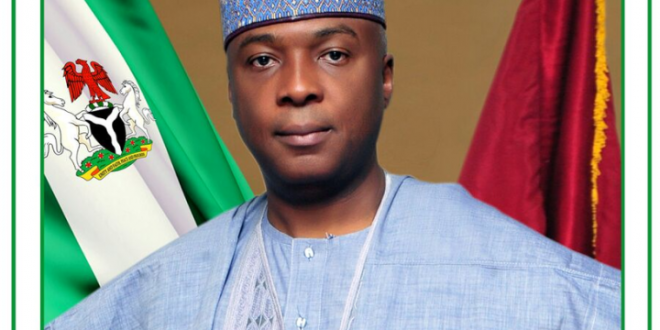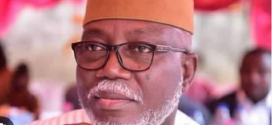– Owing to allegation that N2billion bribe was traced to his bank account, Justice Abdul Kafarati of the Federal High Court sitting in Abuja, on Tuesday, disqualified himself from a suit seeking to stop the ongoing trial of the Senate President, Dr. Bukola Saraki, before the Code of Conduct Tribunal, CCT. Though the suit was scheduled for Judgement, however, Justice Kafarati, said he was left with no option than to hands-off the matter after his attention was drawn to two online publications alleging that he has been compromised by the Senate President. The judge bemoaned that his integrity was gravely “maligned” in two separate reports carried by Sahara Reporters and Naij.com, which he said claimed that the N2bn was traced to his account by the Economic and Financial Crimes Commission, EFCC. “The two publications made allegations against my person, alleging that I have been compromised with N2bn. They also alleged that I am known in the legal cycle for being susceptible to corruption. “What this has done is to put my integrity to question. I however regard the publishers as people of unsound mind. They know that what they said is not true. They just derive pleasure when they malign the integrity of a judicial office. “It is unfortunate that we don’t have the appropriate laws to take care of this. As it stands, I am caught between two devils, if the judgment goes in favour of Saraki now they will say that I have been compromised, on the other hand, if it goes against him they will say I have been intimidated. “In light of the allegation, the right and appropriate thing to do is to disqualify myself and return the case-file to the Chief Judge for re-assignment to another Judge”, Justice Kafarati held. Meanwhile, the decision resulted to a war-of-words between Saraki’s lawyer, Dr. Kayode Oluyode and EFCC lawyer, Mr. Adebisi Adeniyi. Whereas Oluyode fingered EFCC as the brain behind the publications, Adeniyi maintained that it was improper for him to make such “spurious allegation” without proof. “Your Lordship has taken the right steps. It is however unfortunate that the applicant is the one to suffer. It is equally bad that the EFCC has gone to this level. We know that it is behind the publications”, Oluyode insisted. Saraki had approached the high court, praying it to declare that the chairman of the CCT, Justice Danladi Umar is not fit to preside over the 13-court charge preferred against him by the federal government. He told the court that Justice Umar is still being investigated by the EFCC over allegations bordering on corruption. In his fundamental right enforcement suit, Saraki, said he would not be accorded fair-hearing by the tribunal, saying the charge against him was instigated by the EFCC. He argued that Justice Umar, in a bid to save himself from prosecution, would dance to the tune of the anti-graft agency which he said usurped the responsibility of the Code of Conduct Bureau, CCB, by recommending his trial for an offence that was allegedly committed some years back. Contrary to report that it was the CCB that identified discrepancies in four assets declaration forms he submitted while in office as the governor of Kwara State between May 2003 and May 2011, Saraki, told the court that it was the EFCC that okayed him for prosecution before the CCT. He alleged that the criminal case against him was a product of a special task force that was set-up by the EFCC. “The EFCC took away the role of the CCB, then rushed the case before the CCT whose chairman it is investigating”, the Senate President insisted, saying the charge was in gross abuse of his fundamental right to fair hearing and justice. Saying he was “denied the right to be heard before the case was referred to the CCT”, Saraki said it would amount to a violation of his right to fair hearing under section 36 of the 1999 constitution, as amended, for him to be compelled to face trial before a tribunal whose “impartiality and fairness cannot be guaranteed”. Oluyode told the court that the charge against his client which he described as “highly malicious” was “nothing but a political witch-hunt by persons plotting to drag him down”. He therefore sought an order nullifying the charge and the proceedings of the CCT on the grounds that they allegedly fell short of the requirements of Article 3 of the African Charter on Human and Peoples Rights and Section 36 of the 1999 Constitution. Cited as respondents in the suit were the Attorney-General of the Federation, Mr. Abubakar Malami, SAN, the EFCC, the Independent Corrupt Practices and other related offences Commission, and the Inspector-General of Police, Mr. Solomon Arase. Others were the CCB, the CCT, its Chairman, Justice Umar, the second member of the CCT panel, Mr. Ataedzeagu Adza; CCB chairman, Mr. Sam Saba; Director of Public Prosecutions of the Federal Ministry of Justice, Mr. Mohammed Diri; and a Deputy Director in the ministry, Mr. Muslim Hassan (now a judge of the Federal High Court). Saraki sought an order restraining the respondents from prosecuting him based on alleged offences he committed while serving as Kwara State governor. The Federal government had earlier urged the court to dismiss the suit which it said was not only incompetent, but equally failed to disclose any reasonable cause of action.

 Hottestgistnaija.com
Hottestgistnaija.com



